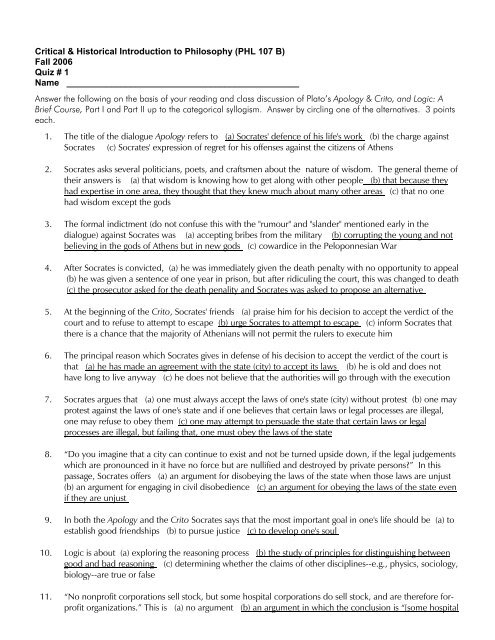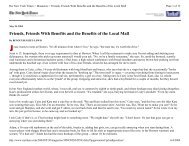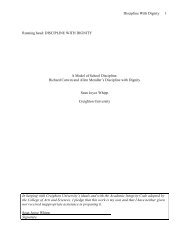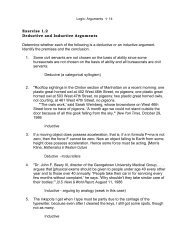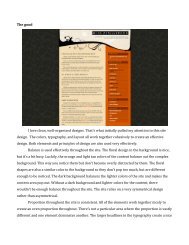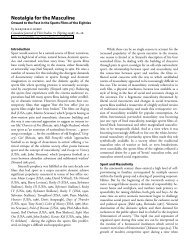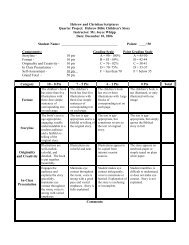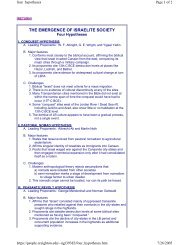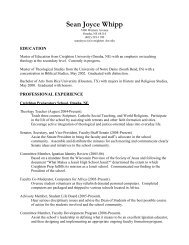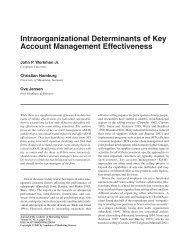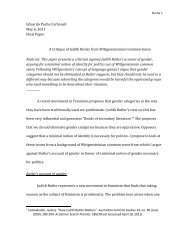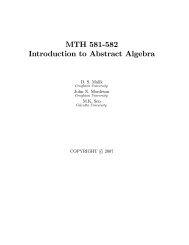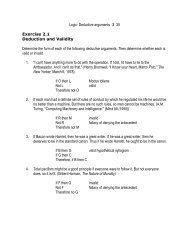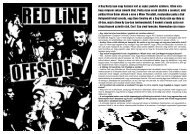Plato_Apology-Crito_..
Plato_Apology-Crito_..
Plato_Apology-Crito_..
Create successful ePaper yourself
Turn your PDF publications into a flip-book with our unique Google optimized e-Paper software.
Critical & Historical Introduction to Philosophy (PHL 107 B)Fall 2006Quiz # 1Name _______________________________________________Answer the following on the basis of your reading and class discussion of <strong>Plato</strong>’s <strong>Apology</strong> & <strong>Crito</strong>, and Logic: ABrief Course, Part I and Part II up to the categorical syllogism. Answer by circling one of the alternatives. 3 pointseach.1. The title of the dialogue <strong>Apology</strong> refers to (a) Socrates' defence of his life's work (b) the charge againstSocrates (c) Socrates' expression of regret for his offenses against the citizens of Athens2. Socrates asks several politicians, poets, and craftsmen about the nature of wisdom. The general theme oftheir answers is (a) that wisdom is knowing how to get along with other people (b) that because theyhad expertise in one area, they thought that they knew much about many other areas (c) that no onehad wisdom except the gods3. The formal indictment (do not confuse this with the "rumour" and "slander" mentioned early in thedialogue) against Socrates was (a) accepting bribes from the military (b) corrupting the young and notbelieving in the gods of Athens but in new gods (c) cowardice in the Peloponnesian War4. After Socrates is convicted, (a) he was immediately given the death penalty with no opportunity to appeal(b) he was given a sentence of one year in prison, but after ridiculing the court, this was changed to death(c) the prosecutor asked for the death penality and Socrates was asked to propose an alternative5. At the beginning of the <strong>Crito</strong>, Socrates' friends (a) praise him for his decision to accept the verdict of thecourt and to refuse to attempt to escape (b) urge Socrates to attempt to escape (c) inform Socrates thatthere is a chance that the majority of Athenians will not permit the rulers to execute him6. The principal reason which Socrates gives in defense of his decision to accept the verdict of the court isthat (a) he has made an agreement with the state (city) to accept its laws (b) he is old and does nothave long to live anyway (c) he does not believe that the authorities will go through with the execution7. Socrates argues that (a) one must always accept the laws of one's state (city) without protest (b) one mayprotest against the laws of one's state and if one believes that certain laws or legal processes are illegal,one may refuse to obey them (c) one may attempt to persuade the state that certain laws or legalprocesses are illegal, but failing that, one must obey the laws of the state8. “Do you imagine that a city can continue to exist and not be turned upside down, if the legal judgementswhich are pronounced in it have no force but are nullified and destroyed by private persons?” In thispassage, Socrates offers (a) an argument for disobeying the laws of the state when those laws are unjust(b) an argument for engaging in civil disobedience (c) an argument for obeying the laws of the state evenif they are unjust9. In both the <strong>Apology</strong> and the <strong>Crito</strong> Socrates says that the most important goal in one's life should be (a) toestablish good friendships (b) to pursue justice (c) to develop one's soul10. Logic is about (a) exploring the reasoning process (b) the study of principles for distinguishing betweengood and bad reasoning (c) determining whether the claims of other disciplines--e.g., physics, sociology,biology--are true or false11. “No nonprofit corporations sell stock, but some hospital corporations do sell stock, and are therefore forprofitorganizations.” This is (a) no argument (b) an argument in which the conclusion is “[some hospital
Critical & Historical Intro. to Philosophy n Quiz # 1 n page 2corporations are] for-profit organizations” (c) an argument in which the conclusion is “no nonprofitcorporations sell stock”12. (1) “Without this welfare program, some poor people would have no means of support, (2) so we simplymust not eliminate it. (3) For the government has an absolute duty to provide everyone with at least thebare essentials of life.” The conclusion of this argument is(a) statement (1)(b) statement (2)(c) statement (3)13. Which of the following is not a characteristic of deductive arguments? (a) if the argument is valid, theconclusion is always true (b) the conclusion is contained implicitly within the premises (c) if theargument is valid, the relationship between the premises and the conclusion is one of necessity14. The relationship between the premises and the conclusion of inductive arguments is always a matter ofprobability because (a) all inductive arguments are flawed arguments (b) the conclusion of an inductiveargument makes a leap into the unknown or future or past (c) we cannot know whether the premises ofinductive arguments are true or false15. Inductive arguments (a) always move from specific to general (b) sometimes move from specific togeneral (c) never move from specific to general16. Validity refers to (a) whether an argument is true or false (b) whether the relationship between thepremises and the conclusion of deductive arguments is correct (c) whether the premises in the argumentare true (d) whether the relationship between the premises and the conclusion of inductive arguments iscorrect17. The strength of an argument refers to (a) how persuasive the argument is (b) whether the relationshipbetween the premises and the conclusion of a deductive argument is correct (c) whether the relationshipbetween the premises and conclusion of an inductive argument is correct18. If the premises of an inductive argument are false and the argument is weak, the conclusion(a) is definitely false (b) may be true or false (c) is definitely true19. If the premises of a deductive argument are true and the argument is valid, the conclusion (a) willprobably be true, although it may be false (b) must be true (c) may be true or false20. In evaluating arguments (both inductive and deductive), there are two tasks one can engage in. One ofthese is (a) to distinguish between the premises and the conclusion (b) to question whether thestatements within the argument are true (c) to analyze the structure of the argument21. The other evaluative task is (a) to determine whether the argument is persuasive (b) to determinewhether the argument is useful (c) to determine whether the relationship between the premises andconclusion is correct22. Truth and falsity are properly applied to (a) statements (sentences) (b) arguments (c) simple concepts
Critical & Historical Intro. to Philosophy n Quiz # 1 n page 323. The originator of the correspondence theory of truth is (a) Descartes (b) Charles Sanders Peirce(c) Aristotle24. The correspondence theory of truth seems to work best for (a) mathematical and ethical statements(b) scientific statements about phenomena far removed from everyday experience (c) statements abouteveryday sense experience25. “Useless claims are sometimes true.” This is a criticism of the (a) correspondence theory of truth(b) coherence theory of truth (c) pragmatic theory of truth26. The coherence theory of truth needs the standard of comprehensiveness because of the problem of(a) determining what the facts are (b) deciding between competing statements from two differentinternally consistent systems (c) determining whether a system of statements is consistent27. A e B This argument form is a (a) valid modus ponens (b) invalid disjunctive syllogismB (c) invalid modus ponens (d) valid modus tollensˆ A28. A e B This argument form is a (a) valid modus ponens (b) valid modus tollens (c) invalid~ B disjunctive syllogismˆ ~ A29. A v B This argument form is a (a) valid disjunctive syllogism for the exclusive or (b) invalidB modus ponens (c) invalid disjunctive syllogism for the exclusive formˆ ~ A30. “Either Jeffrey will take Maria to a movie or he will bring her flowers, or perhaps both. He brought herflowers. Thus he will not take her to a movie.” This argument (a) a valid disjunctive syllogism (b) aninvalid disjunctive syllogism (c) modus tollens (d) modus ponens31. “If the Federal Reserve raises interest rates, my monthly mortgage payment will increase. And if mymortgage payment increases, I will have to stop going to “Francine’s” for dinner. So if interest rates go up,my wonderful French dinners will end.” This argument (a) is a valid modus ponens (b) commits thefallacy of affirming the consequent (c) is a valid hypothetical syllogism32. “Either the herd of deer will be thinned by permitting more hunting, or large numbers of deer will starveto death. The Wildlife Commission decided not to thin the deer by permitting more hunting. Thus itappears that a large number of deer will starve to death.” This argument (a) commits the fallacy ofdenying the antecedent (b) is a valid disjunctive syllogism (c) is an invalid disjunctive syllogism (d) is ahypothetical syllogism33. “If Chalot wins the downhill race, the French will have five gold metals. Chalot did not win the downhill;hence the French did not win five gold metals.” This argument (a) is a valid disjunctive syllogism (b) is avalid hypothetical syllogism (c) commits the fallacy of denying the antecedent (d) is a valid modus tollens


